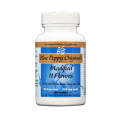Modified Eleven Flavors
60 capsules x 5000mg. from Blue Poppy Originals
Indications: Insomnia, heart palpitations, anxiety, depression, PMS, and perimenopausal syndrome. Digestive complaints, possible asthma or sinusitis, TMJ syndrome (Temporomandibular joint dysfunction)...
Applications in Traditional Chinese Medicine:
Pattern: heart-gallbladder qi timidity with depressive heat in the heart, liver, and possibly stomach and intestines. Heart-gallbladder qi timidity is the shorthand name for a more complex pattern. The entire pattern is made up of a liver-spleen disharmony, i.e., liver depression and spleen qi vacuity, with depressive heat and phlegm harassing the heart spirit as well as heart qi and blood vacuity due to enduring spleen vacuity.
Classical antecedent: Shi Yi Wei Wen Dan Tang Jia Jian
Signs and symptoms of spleen qi vacuity include:
fatigue, especially after eating
cold hands and feet
abdominal bloating after eating
lack of strength in the four extremities
tendency to loose stools but possibly constipation
dizziness when standing up
a swollen tongue with teeth marks on its edges
easy bruising
fine pulse which is often soggy a or soft in the right bar position
The signs and symptoms of liver depression include:
lower abdominal distention/cramping
irritability
rib-side pain
premenstrual breast distention and pain
a bowstring pulse
chest oppression
The signs and symptoms of depressive heat include:
greater irritability
a dry mouth and throat
vexatious heat
a red tongue with possible yellow fur and/or possible swollen edges
a rapid pulse
a bitter taste in the mouth (primarily in the morning on awakening)
The signs and symptoms of phlegm dampness include:
profuse phlegm
swollen glands
mucous in the stools
a wet tongue with possibly slimy fur
postnasal drip
slippery pulse
a tendency towards runny nose
plum pit qi
The signs and symptoms of heart qi and blood vacuity include:
insomnia
lassitude of the spirit
vexation and agitation
disquieted spirit; anxiety
heart palpitations
easy fright
a swollen, pale tongue with a crack or crease down
impaired memory its center reaching to the tip
possible shortness of breath or spontaneous perspiration
Note: The key to discriminating the complex pattern of heart-gallbladder qi timidity is a combination of fatigue, PMS, a bowstring, slippery pulse, and a tendency to wake in the middle of the night in a fright or with heart palpitations plus phlegm in the back of the throat. To use this formula, the patient must also have signs of heat.
Formula explanation:
Within this formula, Codonopsis, Poria, and mix-fried Licorice all fortify the spleen and boost the qi. The heart receives its qi from the clear upborne by the spleen. Therefore, supplementing the spleen qi automatically supplements the heart qi. In addition, Schisandra and Polygala both also supplement the heart qi, while Red Dates, Dang Gui, Zizyphus Spinosa, and Caulis Polygoni supplement heart blood. Further, Schisandra protects stomach, lung, and heart yin from damage due to enduring heat. Orange Peel, Caulis Bambusae, Immature Aurantium, and uncooked Ginger all course the liver and rectify the qi, disinhibit and harmonize the qi mechanism and resolve depression. In addition, if the liver receives sufficient nourishment by the blood due to Dang Gui and Zizyphus Spinosa above, it will therefore be enabled to do its duty of coursing and discharging. Pinellia, Caulis Bambusae, Acorus, Polygala, Orange Peel, and uncooked Ginger all transform phlegm. Caulis Bambusae also eliminates vexation, while both Acorus and Polygala free the flow of the heart orifices and quiet the spirit. Other spirit-quieting medicinals in this formula include Caulis Polygoni, Poria, Zizyphus Spinosa, Licorice, Red Dates, and Oyster Shell. Polygala also frees the flow between the heart and kidneys, while Oyster Shell subdues yang. Hence upward stirring ministerial fire is led back to its lower source. Coptis clears depressive heat in the heart, liver, gallbladder, stomach, and intestines, and Licorice, Red Dates, and uncooked Ginger all harmonize the other ingredients in this formula.
Ingredients:
Mu Li (Concha Ostreae)
Ye Jiao Teng (Caulis Polygoni Multiflori)
Fu Ling (Poria)
Suan Zao Ren (Semen Zizyphi Spinosae)
Zhu Ru (Caulis Bambusae In Taeniis)
Ban Xia (Rhizoma Pinelliae)
Shi Chang Pu (Rhizoma Acori Tatarinowii)
Dang Shen (Radix Codonopsitis)
Wu Wei Zi (Fructus Schisandrae)
Dang Gui (Radix Angelicae Sinensis)
Da Zao (Fructus Jujubae)
mix-fried Gan Cao (Radix Glycyrrhizae)
Chen Pi (Pericarpium Citri Reticulatae)
Zhi Shi (Fructus Immaturus Aurantii)
Yuan Zhi (Radix Polygalae)
Sheng Jiang (uncooked Rhizoma Zingiberis)
Huang Lian (Rhizoma Coptidis)
Dosage:
2 - 3 capsules, 2 times a day
Package:
60 capsules x 5000mg. (500mg. x 10:1 concentration ratio)
Note: All Blue Poppy brand products come with the manufacturing date marked (MFG or Manuf. Date), the expiration date is 5 years from the date indicated on the bottom or side of the packaging.

